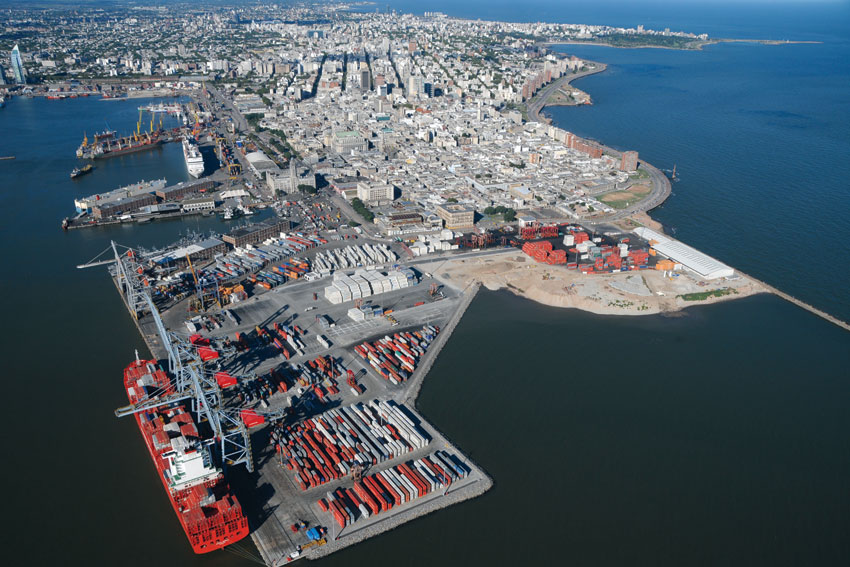Buoyed by high levels of investment and sound economic policies, Uruguay’s impressive growth has been led by a strong focus on export-driven development. While innovation and sustainability have enhanced the country’s reputation for quality produce, the increase in trade is also seeing significant development to its ports

Uruguay is currently reaping the benefits of a decade of political and social stability led by the Frente Amplio Coalition, which won re-election last October with former president Tabaré Vázquez returning to lead the government for another five-year mandate after a run-off ballot in November.
Since assuming power in 2004, the Frente Amplio has made great strides in terms of the economy, social development, and infrastructure. Uruguay was largely unaffected by the global economic crisis of 2008-09, buoyed by the country’s high levels of foreign direct investment, sound macro-economic policies, and tight control on debt levels, coupled with increased social spending. Inflation remains an issue but the IMF forecasts a decrease to 8.3% in 2015 – Uruguay and the IMF have set inflation targets that the government has prioritized – while the deficit-to-GDP ratio is expected to remain at 6.5% this year and unemployment is relatively low at around 7.4%.
As the IMF notes, structural reforms are paramount to attract further investment and President Tabaré’s administration is committed to carrying them through. “Twelve years ago Uruguay went through a crisis whose epicenter was in the financial sector, but that quickly spread to the social sector. That was the starting point for the Frente Amplio administrations, which created an economic team that is still in place. The correct approach to the hike in commodities prices and the massive influx of foreign investment allowed us to turn the situation around and create growth, while also overcoming challenges like the global crisis of 2008 and the recent regional deceleration,” says Governor of the Central Bank, Mario Bergara. “Today we have a panorama where we have grown throughout the last decade at an average of 5%, with a huge increase in exports while reducing the sector’s vulnerabilities and diversifying our production and commercial relations.”
At the social level, Uruguay leads the Latin America region in terms of literacy rates, state-funded education, and access to potable water at 99.5% of the population. The efforts of successive governments to reduce the number of people living below the poverty line have had staggering effects: the figure has dropped from a historical high of almost 40% in 2004 to 11.5% in 2012, the lowest rate in the region. As the Borgen Project, which works with U.S. leaders to combat poverty on a global scale, notes, Uruguayan policies in the field have been hugely successful and the country has met the first of the UN Millennium Development Goals. The World Bank’s Human Opportunity Index also notes that Uruguay has reached a high level of equality in terms of access to sanitation, healthcare, and electricity.
One of the primary reasons for Uruguay’s attraction as a destination for FDI is the country’s stellar record of corruption prevention. The United Nations Corruption Index ranks Uruguay the least corrupt country in Latin America, a statistic also corroborated by Transparency International, which placed the country 21st in the world in its Corruption Perceptions Index 2014.
Year-on-year FDI levels have risen steadily, from $2.289 billion in 2010 to $2.796 billion in 2013. “Uruguay offers very favorable conditions for investment projects: clear economic rules, a long tradition of democracy, and political and social stability. We also have a regulatory framework and lots of incentives with well-equipped human resources, and security and quality of life well above the regional average,” says Dr. Antonio Carámbula Sagasti, CEO of the government’s Investment and Export Promotion Agency Uruguay XXI. “Our challenge is to maintain and strengthen these values.”
In this respect, Uruguay has invested heavily in modernizing the police force and using the latest technology to support the security services. Uruguay also made headlines in 2014 when it pushed through legislation to decriminalize marijuana for personal use, and the government has been active, in conjunction with the U.S., in seeking ways to tackle drug trafficking on a continental level.
“I am not sure that within the region the regulatory measure will gain traction, but the opinion that the policies employed to date are not working is gathering momentum,” says Minister of Home Affairs Eduardo Bonomi. “The so-called war on drugs created terrible problems in Colombia, but when it was transferred to Mexico the problem became worse and has not led to a solution: the dynamic of conflict strengthens the traffickers in terms of what they are prepared to do and the measures they are prepared to take.”
“Uruguay chose a different path and we will see where it leads,” he adds. “We have regulated [marijuana], not legalized it, and in the U.S. there are states that have done the same for medicinal or recreational purposes, and I think we are being observed to see how it goes, and we are also doing the same.”
0 COMMENTS